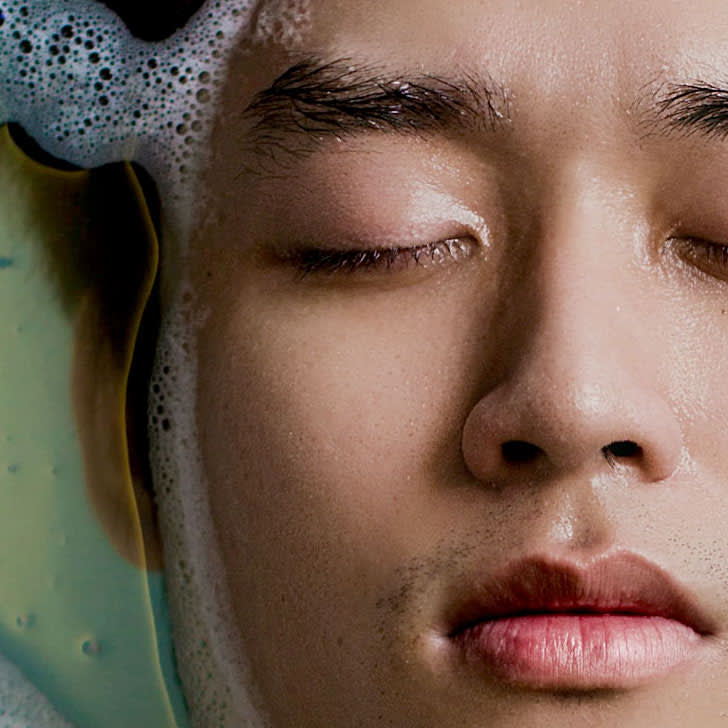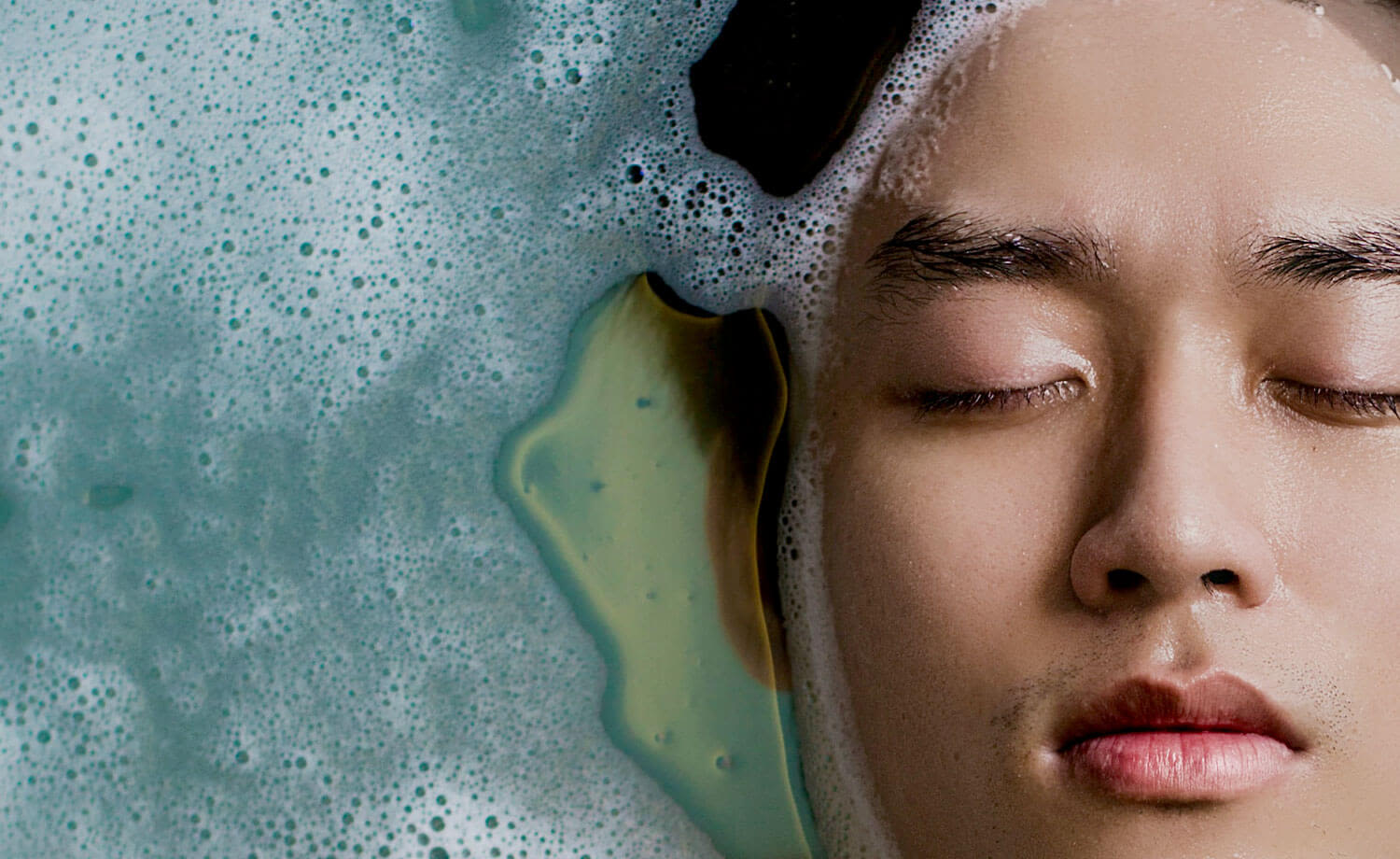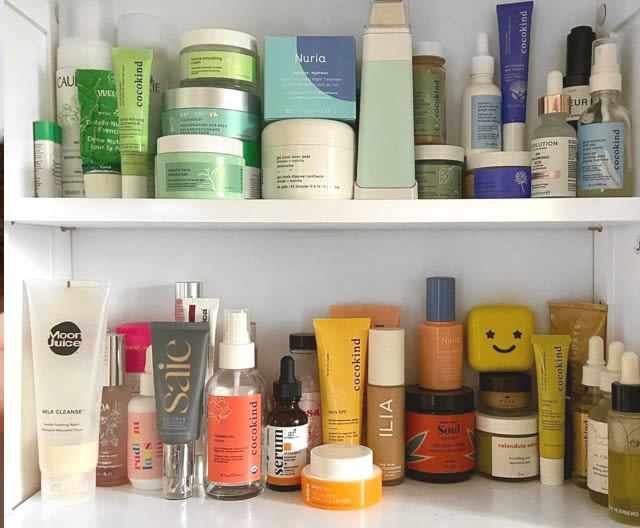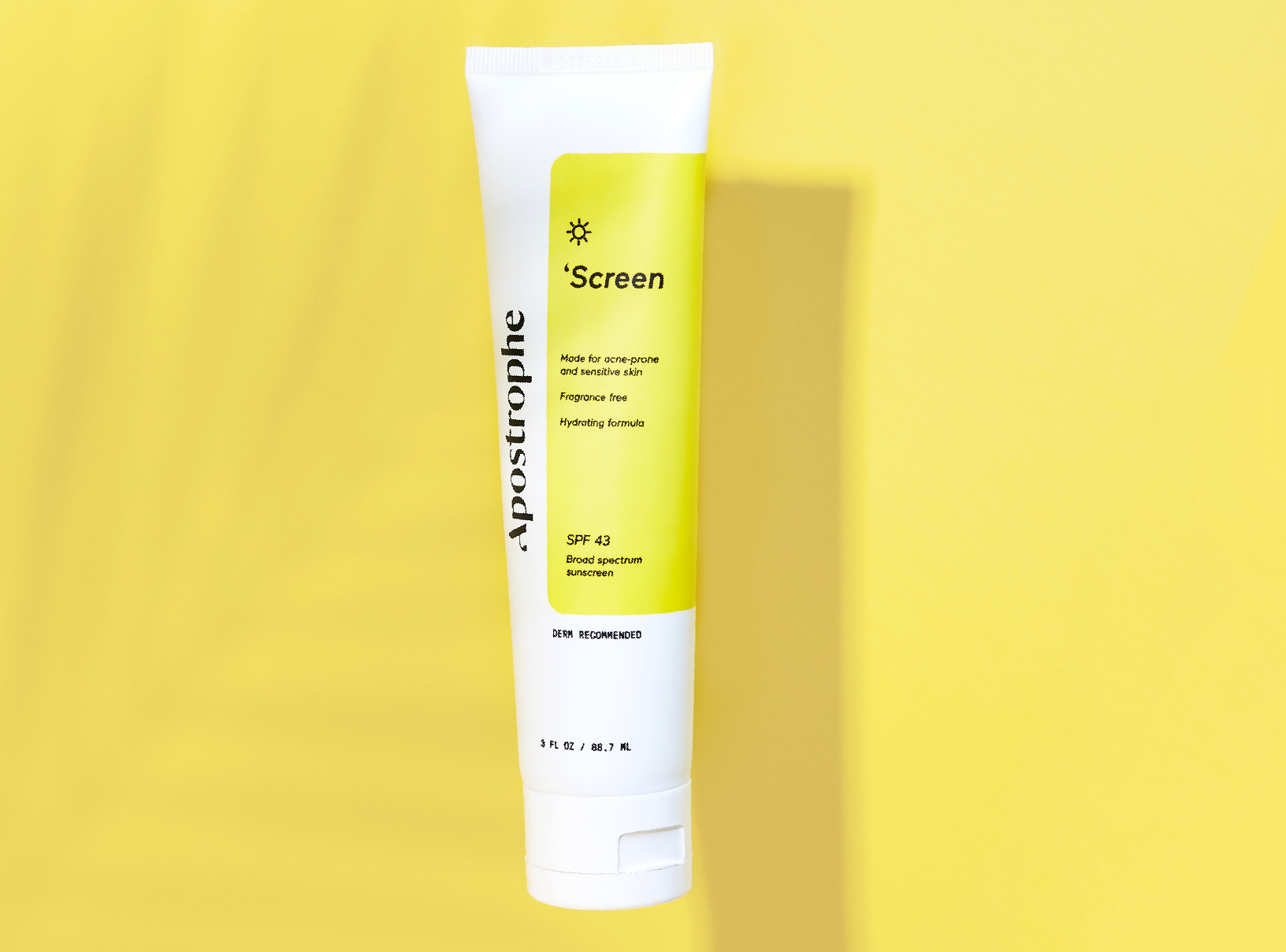Education
What is the best face wash for acne?


SHARE
Education
What is the best face wash for acne?
Medically reviewed by Kristin Hall, FNP
Written by Apostrophe Team
Last updated 4/1/2024
If you’ve ever struggled with acne, you know it’s no simple fix.
It takes a combination of spot treatments, acne creams, and facial cleansers to get the problem under control. Even if you manage to get into a healthy routine, a stressful event or a shift in hormone levels could land you back at square one.
There are plenty of acne treatments on the market to help you deal with breakouts but there’s one more trick you’ll want to have up your sleeve: a good acne-fighting face wash.
Face washes are a dime a dozen but it’s important to put a little thought into choosing one. Not only do you want to pick a face wash that’s appropriate for your skin type, but you want to look for acne-fighting ingredients that will help you control surface oil and kill acne-causing bacteria.
Below you’ll learn which ingredients to look for in a face wash for acne. We’ve also provided some simple skin care tips for acne-prone skin to help you get your breakouts under control.
Acne: The Basics
Acne develops when your hair follicles, or pores, become clogged with dead skin cells and sebum. Bacteria from your skin can also become involved, causing acne blemishes to become inflamed or infected.
Though acne is most common in adolescents and young adults, it can persist into your 30s and 40s. In fact, acne affects up to 15 percent of adult women.
All skin types can develop acne, but it may be more common in oily skin types. Washing your face helps remove excess sebum that might contribute to acne, but some skin types simply produce more oil than others.
Certain ingredients in makeup and skincare products can worsen acne by clogging the pores. Non-comedogenic products don’t have a pore-clogging effect.
Over-the-counter treatments like benzoyl peroxide and facial cleansers can be effective for mild acne but moderate to severe acne may require prescription treatments like tretinoin, clindamycin, or hormonal birth control.
How to Shop for Face Wash
The first rule of thumb to follow when shopping for skincare products is to choose products appropriate for your skin type. The four primary skin types are:
Normal
Dry
Oily
Combination
Some beauty experts add sensitive skin as a fifth type.
Normal skin is neither oily nor dry and it generally looks healthy without any product on it. Dry skin may feel tight due to dehydration and it may be scaly or flaky, depending on the degree of dehydration. In many cases, dry skin is related to low sebum production.
Oily skin is the easiest to identify because it typically has a high degree of shine. Like dry skin, oily skin can be hereditary but it often involves overactive rather than underactive sebaceous glands. Oily skin tends to be more prone to breakouts than other skin types.
As you can probably guess from the name, combination skin exhibits a combination of dry and oily skin, often on different parts of the face.
Knowing your skin type is essential when choosing skincare products because you need to look for ingredients that will provide for your skin’s needs and not exacerbate existing issues.
For example, if you have oily skin you want to use light, water-based products rather than thick creams or heavy facial oils that will sit on your skin. You should also avoid harsh scrubs and drying formulas that might strip the skin of its natural oil, causing it to produce more. Maintaining hydration and balancing sebum production are important for controlling acne.
Acne-Fighting Ingredients to Look For
In addition to choosing skincare products appropriate for your skin type, you should also know what ingredients to look for. When it comes to controlling acne, you want to look for active ingredients that help unclog pores and kill acne-causing bacteria.
That being said, keep in mind that some products contain drying ingredients like alcohol. Drying out or over-exfoliating your skin can lead to irritation which may worsen your acne.
Here are some of the best acne-fighting ingredients to look for:
Benzoyl Peroxide
If you’re not sure where to start with face wash for acne, look for a product that contains benzoyl peroxide. This treatment is ideal for mild to moderate acne and is well tolerated by most people.
Benzoyl peroxide kills acne-causing bacteria and may help reduce inflammation. Treatments range from 2.5% to 10%, but know that stronger concentrations aren’t always better. The higher the concentration, the higher the risk of side effects. In higher concentrations, benzoyl peroxide can dry out the skin which is the last thing you want if you struggle with acne.
Salicylic Acid
If benzoyl peroxide isn’t quite right, try salicylic acid. This beta hydroxy acid helps decrease oil production and exfoliates away dead skin cells so they don’t clog your pores. It may also have anti-inflammatory benefits which can help with moderate to severe cases of acne.
Concentrations vary for products containing salicylic acid but over-the-counter treatments usually contain between 0.05% and 5%. Similar to benzoyl peroxide, lower concentrations are less likely to cause side effects like dryness or irritation.
Alpha Hydroxy Acids
Nonprescription acne products often contain alpha hydroxy acids (AHAs) like glycolic acid and lactic acid. These ingredients help control acne by reducing inflammation and exfoliating away dead skin cells. AHAs may also stimulate skin cell turnover.
Retinol
Another ingredient that helps increase skin turnover, retinol is a vitamin A derivative. By speeding up cell turnover, this ingredient helps prevent dead cells from clogging your pores and causing acne breakouts. You can find acne face washes with varying concentrations of retinol, generally up to 2%. Higher concentrations may be available by prescription.
Tretinoin
Though commonly used as a topical acne treatment, you may be able to find a prescription acne wash made with tretinoin. A prescription-strength retinoid, tretinoin helps fight inflammation and exfoliate dead skin cells.

PRESCRIPTION TRETINOIN
Target acne, dark spots, and signs of aging with this science-backed ingredient.
Though it can be effective for more serious cases of acne, it does come with a risk of side effects. Many people experience skin irritation, dryness, itching, and peeling during the first few weeks of use. As your skin gets used to the treatment, however, these symptoms may resolve.
Sulfur
Though it may be less common today, sulfur was once a staple in acne treatments. This ingredient was often combined with other acne-fighting ingredients like benzoyl peroxide and salicylic acid.
It helps remove dead skin cells to keep them from clogging pores and may remove excess sebum as well. The benefit of sulfur over ingredients like benzoyl peroxide is that it may have a lower risk for side effects.
On top of acne-fighting ingredients, look for ingredients that will hydrate your skin and support its moisture barrier. If your skin becomes too dry it will start to produce excess oil which could make matters worse. Hydrating ingredients like red seaweed extract, rosehip seed, and hyaluronic acid can help maintain the skin’s natural moisture balance.
Skincare Tips for Acne-Prone Skin
Finding the right cleanser for your skin can be a matter of trial-and-error. It’s always best to start with a product appropriate for your skin type, but you may find you need something stronger or that a different ingredient might work better for your skin.
Talk to your healthcare provider or dermatologist if your skin becomes itchy or irritated or if you think you need a stronger formula.
In addition to choosing the right face wash for your acne, there are certain skincare techniques you should implement into your daily routine to help fight breakouts.
Here are some simple skincare tips to keep in mind if you have acne-prone skin:
Wash your face twice daily to remove surface oil, dead skin cells, dirt, and other impurities.
Be gentle with your skin. Use your fingertips when applying product and don’t scrub too hard with exfoliators.
Rinse your skin with cool to lukewarm water - never hot water. Hot water can strip your skin of its natural oils.
Keep your skin hydrated with a moisturizer appropriate for your skin type. You may even want to use different daytime and nighttime moisturizers.
Avoid touching your face as much as possible. Touching your face can transfer bacteria to your skin that might worsen acne breakouts.
Protect your skin from the sun by wearing SPF of at least 30+ during the day.
In Conclusion
Keeping your skin clean is the key to avoiding acne breakouts and that’s where a good facial cleanser comes into play.
Choose a cleanser appropriate for your skin type so you don’t exacerbate existing issues like dryness or excess sebum production, but look for acne-fighting ingredients as well to give your skincare routine a little boost.
Be sure to give new products time to work as well. It may take a few weeks for new skincare products to become truly effective and your skin may go through some changes in the meantime. Stick with it for a few weeks and consult your healthcare provider or dermatologist if your skin becomes red, itchy, or irritated.
Learn More About Treating Acne
If you’re tired of dealing with acne breakouts, it might be time to talk to your healthcare provider or dermatologist. Check out our guide to the acne treatment to familiarize yourself with the options then discuss them with your healthcare provider to find the perfect solution for your skin.
References:
Oge, L.K., Broussard, A., & Marshall, M.D. (2019). Acne vulgaris: diagnosis and treatment. American family physician, 100(8): 475-484. Retrieved from https://www.aafp.org/afp/2019/1015/p475.html
Skin conditions by the numbers. (n.d.). Retrieved from https://www.aad.org/media/stats-numbers
Matin, T. & Goodman, M.B. (2020). Benzoyl peroxide. Retrieved from https://www.forhers.com/birth-control
Tretinoin. (2019). Retrieved from https://medlineplus.gov/druginfo/meds/a682437.html
Rodan, K., et al. (2016). Skincare bootcamp: the evolving role of skincare. Plastic reconstructive surgery global open, 4(12 Suppl): e1152. Retrieved from https://www.ncbi.nlm.nih.gov/pmc/articles/PMC5172479/
Sethi, A., et al. (2016). Moisturizers: the slippery road. Indian j dermatol, 61(3): 279-87. Retrieved from https://www.ncbi.nlm.nih.gov/pmc/articles/PMC4885180/
Endly, D.C. & Miller, R.A. (2017). Oily skin: a review of treatment options. J clin aesthet dermatol, 10(8): 49-55. Retrieved from https://www.ncbi.nlm.nih.gov/pmc/articles/PMC5605215/
Acne: Tips for managing. (n.d.). Retrieved from https://www.aad.org/public/diseases/acne/skin-care/tips
Matin, T. & Goodman, M.B. (2020). Benzoyl peroxide. Retrieved from https://www.ncbi.nlm.nih.gov/books/NBK537220/
Decker, A., & Graber, E. M. (2012). Over-the-counter Acne Treatments: A Review. The Journal of clinical and aesthetic dermatology, 5(5), 32–40. Retrieved from https://www.ncbi.nlm.nih.gov/pmc/articles/PMC3366450/
Alpha hydroxy acids. (2020. Retrieved from https://www.fda.gov/cosmetics/cosmetic-ingredients/alpha-hydroxy-acids
Zasada, M. & Budzisz, E. (2019). Retinoids: active molecules influencing skin structure formation in cosmetic and dermatological treatments. Postepy dermatol alergol, 36(4): 392-97. Retrieved from https://www.ncbi.nlm.nih.gov/pmc/articles/PMC6791161/
Leyden, J., Stein-Gold, L., & Weiss, J. (2017). Why Topical Retinoids Are Mainstay of Therapy for Acne. Dermatology and therapy, 7(3), 293–304. https://www.ncbi.nlm.nih.gov/pmc/articles/PMC5574737/
Wilkinson, R.D., et al. (1966). Benzoyl peroxide and sulfur: foundation for acne management. Can med assoc j, 95(1): 28-29. Retrieved from https://www.ncbi.nlm.nih.gov/pmc/articles/PMC1935555/pdf/canmedaj01171-0030.pdf
Walker K, Basehore BM, Goyal A, et al. Hyaluronic Acid. [Updated 2020 Sep 29]. In: StatPearls [Internet]. Treasure Island (FL): StatPearls Publishing; 2021 Jan-. Available from: https://www.ncbi.nlm.nih.gov/books/NBK482440/
Like what you just read? Sign up for our email list to get the scoop on skincare science delivered straight to your inbox.

Education
What is milia?
What is milia? Today, we’re jumping into one type of bump that you may have heard about most commonly in infants — milia.
Read More
Education
Best moisturizer for acne-prone skin
If you have combination acne-prone skin, figuring out which moisturizer is best for your skin might be tough. In this guide, we break down the best moisturizer for combination, acne-prone skin.
Read More
Education
How to build a face care routine
As you get into skincare, it might seem overwhelming, especially trying to figure out the order you're supposed to apply products in. Below, we detail how to build a face care routine for your skin!
Read More